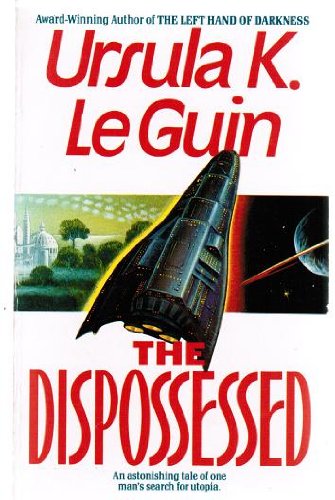emfiliane reviewed The Dispossessed by Ursula K. Le Guin
Review of 'The Dispossessed' on 'Goodreads'
4 stars
A very interesting treatise on people and political situations of our world, using the common theme of having an outsider travel in and experience it firsthand. Most authors lazily make that outsider a savage or alien dazzled by a glittery exterior before discovering the evilness underlying it, watering down the message with hyperbolic caricatures; here he's an erudite scholar expecting pure evil and instead finding far more ambiguous moralities, leaving him ambivalent and constantly contrasting his deteriorating utopian home with the larger capitalist world. Good and ill appear in both worlds while he searches for his place in either, the journey taking him to great cities and far-flung villages, relationships and solitude. The result is a far more nuanced portrayal of Earth, humanity, and even Nixon's United States, sympathetic at times instead of purely condemning, although always leaving one without a doubt that cooperation and empathy are the most laudable.
First and foremost, this is a character-driven story, focused entirely on Shevek and his friends, peers, and eventually family. Although there are periods where the narration meanders off, nearly the entire book is personal interaction or personal reflection. Shevek is a character so sympathetic, patient, and reflective that most will like him, without being too perfect or overly whiny, and anyone who's ever been a shy outsider will know enormous empathy for him. Beyond that, no character is a caricature; all have their faults and redeeming traits, and all can be viewed in multiple lights, and by the end, you can remember all as entirely separate people. No two blend together.
In Anarres, Le Guin combines communism, frontierism, feminism, gay rights, cultism, and free love into a world that avoids moralizing about anything but egoism, the vice of self-interest. Surviving over 150 years cut off from outside influence, the experiment is undoubtedly a success; for the most part, everyone considers everyone else family, each pulling for the good of all, everyone raised to think of the group first, and only in the capitol does ego start to show through. Smaller frontier towns are definitely romanticized as the most committed to the ideals of the founder and martyr, Odo. However, once the setting shifts to the home world Urras, it becomes apparent that the world is remarkably grey and lifeless in comparison, with few plants and no animals and endless hot, dry weather; later it's obvious that they've also become hostile to art, extravagance, and anything else that's "impractical," the unfortunate reality of hard frontier life. Rare imperfections are acknowledged, like the socially outcast drifters who refuse to work, but social conditioning is acknowledged as keeping most people happily in line and willing to do whatever is expected. In the later days of the Hippie counterculture movement, Le Guin saw anarchy, revolution, and the breaking of conditioning being at least as important as cooperation itself; I imagine she was immensely pleased with the punk movement that sprung up shortly after Dispossessed's publication.
Then comes famine, rations, and hunger, and suddenly basic survival begins to trump upbringing. And yet once famine eases and its memory fades, social conditioning takes over and society reassertion itself, a forced return to normalcy to save the psyche. People prefer to avoid anarchy at all costs when they have anything to lose, even the slightest comfort, which prompts Shevek to begin his new revolution. Only a lifelong outsider is disconnected enough to be willing to tear down their world.
Any Utopia depends on the presence of plenty, or at least enough; in a way, the US and the western world are Utopias right now - despite the endless pressure for money and material and more, everyone has basic survival covered. By simply wanting less, exploiting others less, and treating strangers more like family, who knows what might change? That ideal underpins the book.
Likewise the odd chapters compare Shevek's naive childhood prejudice against the reality of their home world. Like Americans who travel to Russia or Iran or vice versa, things are never so simple; the world is awe inspiring, many excesses and many poor yet many great luxuries and many protected natural environments - and many things that the powerful would prefer to never see or show. An agent from a USSR analogue appears, and a proxy war in another country between them and the primary capitalist nation erupts, just to drive home the analogy in a heavy handed way. The vicious handling of the popular uprising evokes the Kent State shooting while echoing the tactics of the Soviets against the Hungarian Revolution, extrapolating from the culture of fear and oppression during the Nixon presidency. Although some areas could have used a little more nuance, very little of the story is dedicated to grand battles but rather the individuals caught up in them, athe post of the book is a level headed look at the struggle between power and empathy in all, regardless of what your culture values and how you were raised.
My main complaint is that it's a bit tough to switch gears every chapter; it's so easy to get sucked in, especially when many end on a cliff-hanger. I usually had to set the book down and breathe for a few minutes or a day to start again, a bit unfair to the reader, I feel.
One of my favorite scenes is the drunken party, the writing speeding up dizzily as Shevek drinks, how eloquently it captures the effect of your first heavy drinking night as copious alcohol grinds away the shyness, turns you forceful and charismatic.... Then carried away into making a glorious fool of yourself, hormones in overdrive, followed by the queasiness and horrified memories the next morning. Certainly less idealism, but Le Guin writes at her absolute best channeling that spinning blur, like the events of the rally later.

